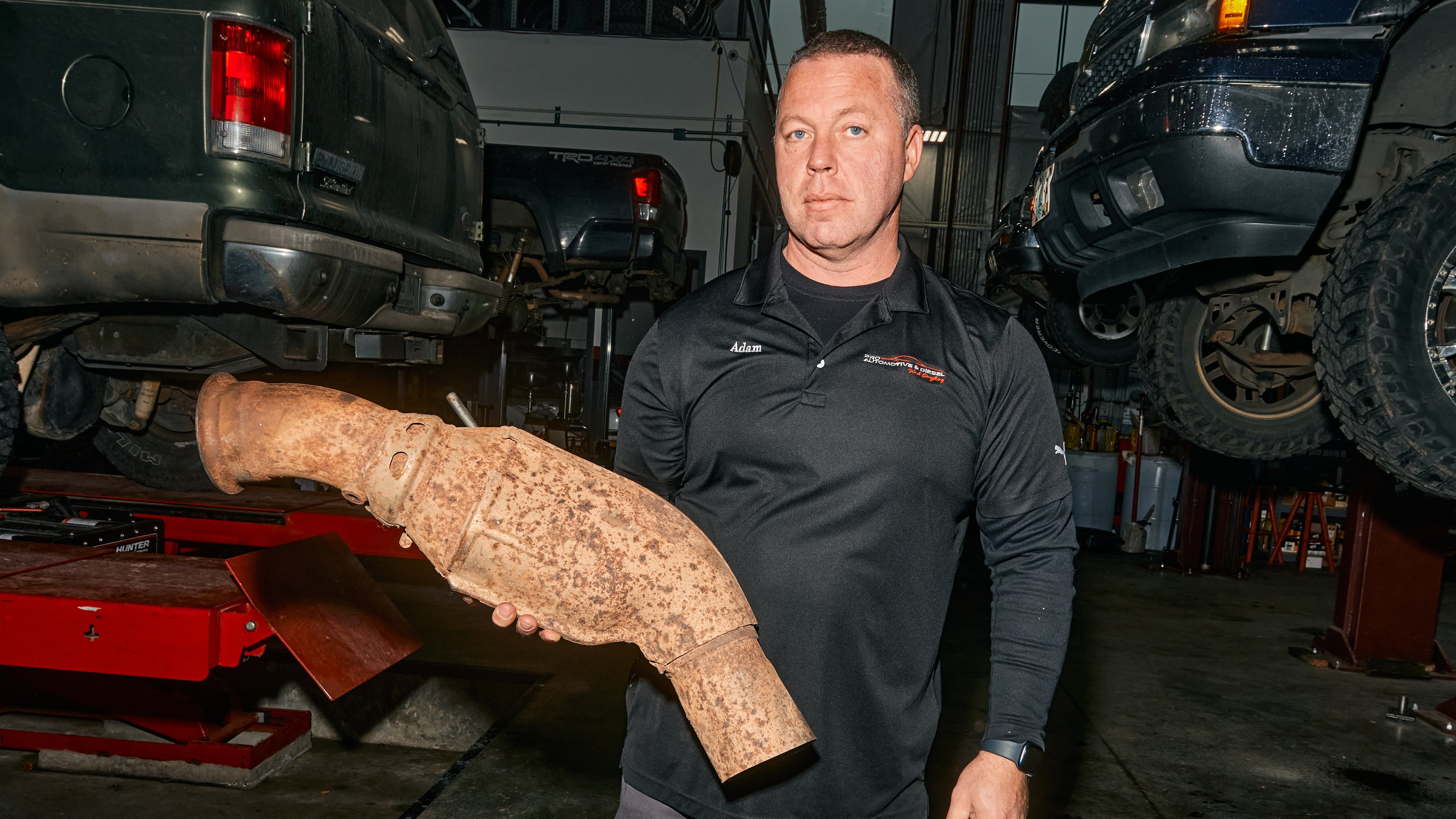Brennan Doyle, who was arrested in 2022 and accused of leading a $20 million catalytic converter theft ring from his Lake Oswego home, told police he was trying to run his business “as legit as possible.”
Was he legit enough? That’ll be up to a jury. His trial, on charges of racketeering, is scheduled for October.
There, prosecutors will seek to prove that Doyle was aware that his merchandise was stolen. To do it, they have convinced several of Doyle’s alleged accomplices, including his former girlfriend, to testify. They’re also sitting on a mountain of evidence collected during months of wiretaps and surveillance (“From Portland to Jersey,” WW, Nov. 11, 2022).
Now, much of that evidence is public. That’s because prosecutors are seeking to consolidate Doyle’s case with that of one of his alleged co-conspirators, Tanner Hellbusch, who’s accused of doing the dirty work of stealing the devices from under Portland cars (and, on other occasions, fencing the catalytic converters others stole).
To consolidate the cases, prosecutors must convince a judge that the two men’s crimes are similar—and on June 18 they filed a police report, drafted by the lead investigator in the case, Beaverton Police Detective Patrick McNair, in Washington County Circuit Court to make their argument.
The 50-page report has been ready to go for a while: It’s dated April of last year. It documents the evidence that Doyle was aware that the parts Hellbusch was selling him were stolen. We turned the pages to bring you the highlights.
The ring profited from people desperate for cash to fuel their addiction to fentanyl.
Beaverton police wiretapped Hellbusch’s phone and, in June 2022, overheard a conversation between him and another man, Jessie Hillard. (Hillard was one of a dozen people charged in the ring, and pleaded guilty last year.)
During the conversation, the two men discuss a deal to purchase a catalytic converter taken off of a Dodge pickup truck, worth at least $1,000 due to the precious metals it contained. Hillard says the seller is desperate: “You know how he is, fuckin’ blues, man,” referring to counterfeit oxycodone pills, laced with fentanyl, common on Portland streets at the time.
Hellbusch tells Hilliard to lowball the seller, according to the police report, and Hillard ultimately purchases it for $400. Hellbusch largely dealt in cash but would sometimes reimburse Hillard using CashApp, with payments disguised as mundane transactions, like “riding lawnmower.”
Doyle shared tips with another alleged catalytic converter kingpin.
Police also tapped Doyle’s phone. The next month, July 2022, they recorded a conversation between Doyle and a man they believe to be Cedrus King, who was arrested shortly after Doyle and charged with running his own criminal operation fencing stolen catalytic converters in Bend.
The two discussed Hellbusch, who’d recently been caught by police with a load of catalytic converters in his car.
And they brainstormed ways to keep cops at bay. “The nature of the conversations was not around actually keeping stolen catalytic converters from making their way into their business, but rather it was about how to avoid liability for purchasing stolen catalytic converters,” Detective McNair wrote.
One of those strategies: fake paperwork. Hellbusch had a friend who worked at a scrap yard who he hoped could manufacture a paper trail, according to police’s interpretation of text messages obtained from an accomplice’s phone.
Doyle took precautions as police closed in.
Police had been surveilling Doyle’s shop in Aurora, where his employees packaged shipments. After Hellbusch was pulled over again by police in March 2022, Doyle told one of those employees, a high school friend named Benjamin Jamison, that he was hunting for a new shop and planned to pause operations. (Jamison was also indicted and has since pleaded guilty.)
Hellbusch was becoming a liability. “I might have to cut ties with him,” Doyle explained. “Or find him a new buyer.”
As Oregon cops closed in on Doyle and King, federal law enforcement was moving in on the big East Coast buyers of catalytic converters: Adam and Matt Sharkey, two brothers in Long Island, N.Y.
That business was a family affair. In May 2022, their father was pulled over in Oklahoma with three pallets of catalytic converters—and $1.3 million in cash.
Matt Sharkey texted Doyle to warn him: “We had some really really terrible circumstances in the last 2 days and can no longer travel with cash.” That text, which Doyle forwarded to Jamison, is now included in McNair’s report.
So is Doyle’s commentary: “Not gonna be good,” he wrote.
